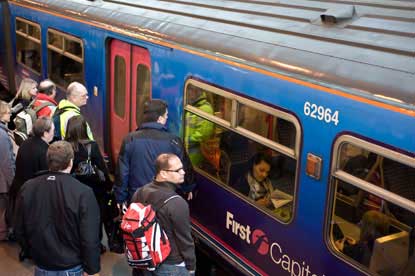By Richard Johnstone | 16 December 2011
MPs today asked the National Audit Office to review the government’s controversial decision to award a major train building contract to German firm Siemens over a bid based in Derby. The Commons transport select committee called for the independent examination of the £1.4bn deal after its own inquiry was stymied by confidentiality agreements.
The Commons transport select committee called for the independent examination of the £1.4bn deal after its own inquiry was stymied by confidentiality agreements.
Following the decision in July, losing bidder Bombardier announced that 1,400 jobs would go at its Derby factory, leading to calls for the government to re-examine the award of the work abroad.
In response, the select committee declared in summer that it would examine the contract, which involves building 1,200 carriages for the Thameslink cross-London route between Bedford and Brighton. The MPs have now asked the auditor general to report to Parliament before summer 2012.
Launching the committee’s review of the deal, chair Louise Ellman said the members were unable to evaluate whether the decision to choose Siemens was arrived at correctly because all the bids were, and remain, confidential.
‘We believe that in the public interest an independent review must evaluate whether this massive contract was awarded correctly on the basis of the criteria in the original invitation to tender,’ she said.
Ellman added that both the current and previous transport secretary have ‘made plain they have no intention of starting the process again because of the delays they consider this will lead to’.
The additional trains are part of an upgrade plan for the Thameslink route, which is currently operated by the First Capital Connect franchise.
A spokesman for the NAO said that the auditor general would consider the request and respond in due course. A preliminary investigation earlier this year concluded that it would not be appropriate to conduct a value for money examination at that time, as nothing was found to indicate that the Department for Transport had not followed procurement law.
The MPs say that there is now ‘widespread agreement’ that the criteria used in the tender were too narrowly drawn, excluding factors such as the economic and employment consequences of the deal.
They have also concluded that Siemens’ higher credit rating made a ‘significant contribution’ to its success in winning the deal.
The winning bidder will also privately finance the cost of building the trains. The committee has warned that this type of bundling skews the market towards larger multinational firms, at the expense of domestic manufacturing.
When awarding the contract, the DfT said that it had no choice but to pick Siemens because European Union procurement laws state that a bidder’s location or nationality cannot influence contract awards.



MPs today asked the National Audit Office to review the government’s controversial decision to award a major train building contract to German firm Siemens over a bid based in Derby.
 The Commons transport select committee called for the independent examination of the £1.4bn deal after its own inquiry was stymied by confidentiality agreements.
The Commons transport select committee called for the independent examination of the £1.4bn deal after its own inquiry was stymied by confidentiality agreements. Following the decision in July, losing bidder Bombardier announced that 1,400 jobs would go at its Derby factory, leading to calls for the government to re-examine the award of the work abroad.
In response, the select committee declared in summer that it would examine the contract, which involves building 1,200 carriages for the Thameslink cross-London route between Bedford and Brighton. The MPs have now asked the auditor general to report to Parliament before summer 2012.
Launching the committee’s review of the deal, chair Louise Ellman said the members were unable to evaluate whether the decision to choose Siemens was arrived at correctly because all the bids were, and remain, confidential.
‘We believe that in the public interest an independent review must evaluate whether this massive contract was awarded correctly on the basis of the criteria in the original invitation to tender,’ she said.
Ellman added that both the current and previous transport secretary have ‘made plain they have no intention of starting the process again because of the delays they consider this will lead to’.
The additional trains are part of an upgrade plan for the Thameslink route, which is currently operated by the First Capital Connect franchise.
A spokesman for the NAO said that the auditor general would consider the request and respond in due course. A preliminary investigation earlier this year concluded that it would not be appropriate to conduct a value for money examination at that time, as nothing was found to indicate that the Department for Transport had not followed procurement law.
The MPs say that there is now ‘widespread agreement’ that the criteria used in the tender were too narrowly drawn, excluding factors such as the economic and employment consequences of the deal.
They have also concluded that Siemens’ higher credit rating made a ‘significant contribution’ to its success in winning the deal.
The winning bidder will also privately finance the cost of building the trains. The committee has warned that this type of bundling skews the market towards larger multinational firms, at the expense of domestic manufacturing.
When awarding the contract, the DfT said that it had no choice but to pick Siemens because European Union procurement laws state that a bidder’s location or nationality cannot influence contract awards.



















